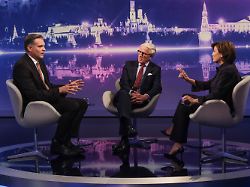Maischberger on the Wagner uprising
“Putin bought himself time”
By Marko Schlichting
6/28/2023 5:06 am
How weakened is the Russian president after the Wagner troops rebelled? And what about the head of the military company? One of the experts at “Maischberger” says that Prigozhin could be absent from Putin, at least in his role as a scapegoat.
The revolt of the Wagner mercenaries was quickly called off, but it should not remain without consequences for Russia. Many experts in Germany hope so. These include the former German ambassador in Moscow, Rüdiger von Fritsch, and Frederik Pleitgen, chief international reporter at CNN. The two discuss with Maischberger on ARD how things could continue after the events of the weekend in Russia. Both agree on most points.
Putin’s weakness
Since the rebellion on Saturday, Russian President Putin has reacted defensively, explains von Fritsch. “He is weakened in several ways: he completely miscalculated his puppet Prigozhin, he was unprepared for the rebellion, he had to ask his weak assistant Lukashenko for help, and he had to withdraw statements he had made in front of witnesses within eight hours And if there’s one thing you can’t show in Russian politics, it’s weakness,” the diplomat said.
This is the only point where the assessment of the two experts differs. Because Frederik Pleitgen does not consider Putin weakened. “Putin bought himself time,” he says. Under their leader, the Wagner soldiers had come close to Moscow, “But it became clear relatively quickly that none of the people who were waging the war for Russia and who are also important in politics had backed Prigozhin.” In addition, the Wagner convoy, which consisted of 400 tanks, could not have done much in Moscow. According to Pleitgen, things are not looking so bad for Putin: he has got rid of the Wagner boss, and his mercenaries will go to Belarus or go home, unless they join the Russian army. But then Pleitgen qualifies: “But if things continue to go badly on the battlefield, then Putin has a problem, because then he won’t have anyone left to blame.”
The future of Prigozhin
Rüdiger von Fritsch describes rebel leader Prigoschin as a “Soldateska leader who is a hopeless politician.” However, Pleitgen adds that his troops are dangerous. While reporting from Ukraine, the journalist himself came under fire from militia officers. Wagner troops are still fighting in various African countries, for example in Mali. Prigozhin himself founded a “troll factory” in St. Petersburg, which means he is involved in cybercrime on a large scale. “And he may be involved in the smuggling environment in North Africa and, in the interests of the Kremlin, ensures that as many migrants as possible come to Europe by sea,” says Pleitgen. Nonetheless, if he were in Prigozhin’s place, he would be careful when drinking tea, says the journalist, and von Fritsch warns that balconies on the third floor could also be dangerous. In fact, agents of the Russian secret service are blamed for several poisonings of disgraced Russians, and they are also said to have provoked the occasional fall from the balcony. According to the two experts, Prigozhin’s life, despite his popularity with the people of Russia, is no longer worth much.
What comes after Putin?
Fritsch and Pleitgen also agree that the Putin era in Russia will not end any time soon. Pleitgen is certain that Putin has been weakened, but not in such a way that things could get dangerous for him.
Von Fritsch hopes that after a possible change of power in Moscow, a government will come into power that will quickly end the war against Ukraine. However, he can also imagine an even more confrontational state leadership, which could lead to chaos or a disintegration of Russia. “Therefore, the goal should not be to overthrow Putin. The goal must be to get him to reconsider and make him realize that if he continues the war, he will lose his power. And that could be the point of willingness to negotiate,” hopes from Fritsch.
